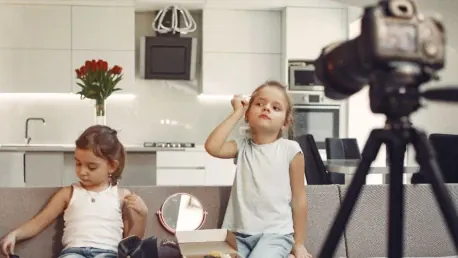Family vlogging has swiftly transformed from a niche hobby into a lucrative industry for countless families who share their daily lives on platforms like YouTube and Instagram. This widespread broadcasting of children’s personal lives to millions of viewers, while potentially profitable, has raised significant concerns about the financial, ethical, and psychological impacts on the children involved. Recent legislative efforts in the United States aim to address these issues, ensuring that children are protected from exploitation, and advocating for their rights and well-being in the burgeoning realm of social media.
The Rise of Family Vlogging and Its Impacts
As family vlogging continues to gain popularity, families monetize their content by featuring their children’s day-to-day activities, celebrations, challenges, and milestones. The financial incentives can be substantial, drawing many into the practice. However, these benefits often overshadow the ethical implications and psychological impacts on the children who become central figures in these digital narratives. Many of these children, too young to give informed consent, are thrust into an unrelenting spotlight, yielding a complex array of potential long-term consequences.
The ethical dilemma revolves around privacy and the children’s welfare, as their lives become public domain without their understanding or agreement. The constant exposure can lead to developmental issues, self-esteem problems, and mental health challenges as they mature. Critics argue that these children are, in effect, performing labor without appropriate protections or acknowledgment, akin to child actors but without the regulatory safeguards traditionally afforded to them. This has spurred calls for stringent regulations to protect these young influencers from exploitation by prioritizing their rights and well-being over potential financial gains.
Legislative Efforts to Protect Child Influencers
In response to these growing concerns, a number of states have introduced laws specifically targeting the protection of children featured in family vlogs. Illinois, Minnesota, and California have emerged as leaders in this legislative movement, each implementing measures aimed at ensuring the financial and personal interests of these children are safeguarded. The legislative frameworks seek to offer a balance between the profitable aspects of vlogging and the fundamental rights of children.
Illinois has pioneered significant legal protections, mandating that 50% of earnings generated from content featuring children be placed into trust accounts, which will be accessible only when the children turn 18. This law ensures that the children benefit financially from their participation, instead of allowing parents to exclusively reap the rewards. In Minnesota, legislation introduces similar financial protections and also imposes stricter regulations, prohibiting children under 14 from appearing in more than 30% of their parents’ content. These measures aim to limit exposure and mitigate potential exploitation and abuse.
The Case of Ruby Franke: A Catalyst for Change
Ruby Franke’s case is perhaps the most high-profile example that has brought national attention to the darker side of family vlogging. Franke’s abusive behavior towards her children, compounded by the pressures of maintaining a family vlog, resulted in her arrest and conviction for child abuse. This incident has played a pivotal role in shining a spotlight on the potential harms inherent in family vlogging, raising public awareness, and prompting legislative changes.
Shari Franke, Ruby’s oldest daughter, has been particularly vocal about the harmful impact of being unwillingly thrust into the social media limelight. Her powerful testimony before Utah lawmakers highlighted the deep-seated psychological damage and long-term effects of being a child influencer without consent. Her experiences have underscored the urgent need for legal protections, and her bravery in sharing her story has been instrumental in driving legislative change. The Franke case serves as a potent reminder of the potential dangers associated with family vlogging and the critical importance of safeguarding children’s rights.
Ethical Considerations and the Need for Consent
A significant ethical issue in family vlogging is the absence of informed consent from the children involved. Young children, by virtue of their developmental stage, cannot fully comprehend the implications of their online presence, which raises concerns about future privacy issues and the potential misuse of their appearances. This dynamic places a heavy ethical onus on parents and content creators to act in the best interests of their children, prioritizing their well-being over commercial success.
The new legislation seeks to address these ethical concerns by implementing financial safeguards and limiting the volume of content featuring young children. By mandating that earnings be set aside for the children and restricting their participation, these laws attempt to create a balance between the benefits of social media content creation and the fundamental rights of minors. These measures are designed to mitigate exploitation and promote ethical standards within the family vlogging sphere.
The Role of Social Media Platforms
Social media platforms such as YouTube and Instagram play an integral role in the ecosystem of family vlogging, directly influencing how content is created and consumed. In light of the growing awareness of potential exploitation, there is increasing pressure on these platforms to adopt more robust regulations that prevent the misuse of child influencers. Implementing policies that prioritize the protection of children could significantly impact their profitability, but it is a necessary step in fostering a safer online environment.
Although some efforts have been made by these platforms to address these issues, there remains considerable room for improvement. Active regulation of monetized content featuring children and enforcement of ethical standards are crucial steps in mitigating exploitation. These platforms bear a shared responsibility to collaborate with lawmakers, content creators, and advocacy groups to ensure that children’s rights and well-being are upheld, even if it means placing ethical considerations above financial incentives.
Moving Forward: Broader Legislative Adoption and Industry Responsibility
Lawmakers are increasingly aware of the need to regulate this space, addressing the potential risks and ethical dilemmas associated with family vlogging. These efforts aim to hold parents and content creators accountable while advocating for the children’s best interests, creating a safer environment for young participants in this booming industry.









